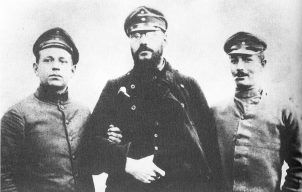Wilhelm L. Gruner
There is little biographical information on Wilhelm L. Gruner. This is what I could gather:
Wilhelm L. Gruner was born on 12 April 1888 in Coburg (Germany). It is unknown where he studied, but he later moved to Berlin and worked as a piano accompanist. Surprisingly a photo of him exists because Wilhelm Gruner was a close friend of the German journalist and writer Kurt Tucholsky. It seems the two were fellow soldiers in the same military unit and Tucholsky penned down an anecdote including Gruner. The story happened during World War I when the unit of Gruner and Tucholsky was stuck in the static warfare in Courland (now a part of Latvia). The story goes like this:
"A high-ranking "Excellency" stepped into the barracks and asked all soldiers for their names and their professions. Everything looked fine until Excellency asked my good old mate Gruner: "And you?" - "Composer, Excellency!" - "Ah" - the authority looked like he had found a flea circus ringmaster. "Composer, well, did you already compose anything?" - "Yes, Excellency! An opera!" - "An opera? What is the name of the opera?" - "Maja, Excellency!" - "Maier? Do you know Maier?" - No, the adjutant didn't know Maier either. - "Where was the opera performed?" - "At the Royal Theatre of Wiesbaden, Excellency!" - That was noticed by the man. Royal Theatre... "Well, well", he said appeasingly. But one final idea came up his mind: "How often?" - "Three times, Excellency!" - Big pause. And then Excellency asked very slowly and clearly: "And from that opera you want to make a living?" - And then he stepped out forcefully to the eastern theatre of war."
On the photo above one can see (from left to right): Kurt Tucholsky, Wilhelm Gruner and Ludwig Pinner. Ludwig Pinner (1890-1979) was an agricultural scientist who emigrated to Palestine in 1921.
In 1920 Kurt Tucholsky wrote a short, fairytale-like story titled "Die verzauberte Prinzessin" (The enchanted princess) which he dedicated to Wilhelm L. Gruner.
Beside the information about the opera "Maja" some old encyclopedias also mention a symphony, a piano concerto, a string quartet, piano pieces and songs in the work catalogue of Wilhelm Gruner. Gruner's "Menuett op.7" was arranged for light orchestra by Hans Bullerian in the late 1930s and published by Simrock.
I found no further information about the life of Wilhelm Gruner. It remains unknown when and where he died. He is mentioned without a date of death in the 1936 edition of the "Tonkünstlerlexikon" by Altmann, so it seems likely that Wilhelm L. Gruner died after 1936.
In my possession are two autograph manuscripts of song cycles by Wilhelm L. Gruner. The "5 Gesänge op.8" and the "4 Gedichte op.11"
4 Gedichte op.11
The "4 Gedichte op.11" (4 Poems) are scored for voice and piano. The song cycle contains two songs on words by Max Geißler and two songs on words by Hermann Hesse. The titles are: 1. Graue Tage (Geißler), 2. Schlummerlied (Geißler), 3. Jugendgarten (Hesse) and 4. Wolken (Hesse).
There are no information in the manuscript when the work was composed. And the songs were never published.
5 Gesänge op.8
The "5 Gesänge op.8" (5 songs) are scored for voice and piano. The five included songs are: 1. Die drei Prinzessinnen (La-Ksu-Feng/Bethge), 2. Mond und Menschen (Tschan-Jo-Su/Bethge), 3. Frühlingslied (Drachmann/Forbes-Mosse), Herbst (Holstein/Forbes-Mosse) and 5. Nun verkündet es laut all ihr Glocken (Swarth/Hauser).
Again there are no information in the manuscript when the work was composed. And the songs were never published.

